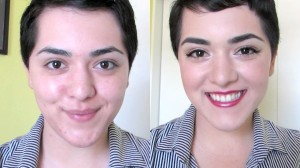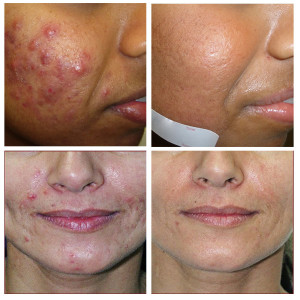 Acne affects many people of all ages and comes in a variety of types and locations. One type of acne is Vulgaris which a common, chronic disease related to the sebaceous follicle.
Acne affects many people of all ages and comes in a variety of types and locations. One type of acne is Vulgaris which a common, chronic disease related to the sebaceous follicle.
It typically resides on the face, chest and back. Normally acne first appears around the time of puberty and can follow sufferers well into their 30s and beyond, but is usually most severe between the ages of 16 and 18 years of age.
Although vulgaris typically appears in both sexes, it does tend to be more prevalent in males than in females. Girls may see additional flare ups around the time of their menstrual period.
The face is the most common area for acne to appear, but it is also common to find it on the back and chest.
Some with acne are affected more than others and the degree of which acne appears is based upon age, genetics, and other individual factors.
Acne Prevention
Professional treatment of acne is sometimes required depending on the severity of the case. However, those who experience mild vulgaris acne can usually tend to the issue on their own by way of specialized soaps and cleaners.
You should always keep your face clean and avoid touching your face to keep from spreading bacteria and dirt across your face.
You may also find that some diet related items may affect your acne, but there is no scientific evidence related to this claim.
Some studies have been conducted, but no solid decision has been made regarding the exact foods that trigger outbreaks.
Acne Treatment
 There are also many antibiotics and treatment methods that a dermatologist may prescribe to you in the event of severe vulgaris acne.
There are also many antibiotics and treatment methods that a dermatologist may prescribe to you in the event of severe vulgaris acne.
Normally, topical acne treatment methods contain around 10% of salicylic acid which has been shown to be very effective when fighting acne. These treatments can be applied to the entire face as well as the back and chest areas.
Other ointments contain azelaic acid which has been found to be a little less irritating than other forms of treatment.
At times, your treatment method may cause your skin to become red or inflamed. If you are experiencing major issues related to treatment, you should visit your dermatologist as soon as possible.
Benzoyl peroxide may be beneficial in certain, more mild, situations. It can be a bit irritating to the skin and usually causes peeling after a few days.
You should start with a 5% concentration to begin with and never use a product that offers more than 10%.
You may experience a burning sensation, especially if your skin is exceptionally oily. Usually benzoyl peroxide is combined with clindamycin or erythromycin.
You may also find some antibiotics to be beneficial when preparing your acne vulgaris treatment. However, your body may have developed a resistance to antibodies and overall effectiveness may be decreased. For these instances, you should combine this treatment method with zinc or benzoyl peroxide.
Many options are available for treatment and it is best to seek professional guidance when determining what your treatment method should be.
Dermatologists will have the ability to prescribe specialized medication to help fight against acne vulgaris and advise you on specific cleaning methods.
If not treated properly, acne has the ability to form permanent scars and blemishes. However, it is possible to treat these issues as well. Before treatment, however, you will need to determine if your skin is ready for the treatment process.
If your skin is still in the healing process, many of the methods will be too harsh for the sensitive area and may cause even further damage. It is important to wait until the acne is under control before beginning the process of ridding the skin of any leftover blemishes.
When your skin is ready for treatment, you should choose a product that contains a combination of the following ingredients:
![]() Kojic Acid
Kojic Acid
![]() Vitamin C
Vitamin C
![]() Licorice Extract
Licorice Extract
![]() Glycolic
Glycolic
![]() Alpha Hydroxy Acids
Alpha Hydroxy Acids
Each of these ingredients works to help ease the appearance of scars and blemishes. Some of the products that you may want to consider are:
![]() Glycolic Foaming Cleanser
Glycolic Foaming Cleanser
![]() Glycolic Acid Toner
Glycolic Acid Toner
![]() Whitening Mask
Whitening Mask
![]() Drying Cream
Drying Cream
![]() Healing and Smoothing Mask
Healing and Smoothing Mask
![]() Suncare – Protects against UV Exposure
Suncare – Protects against UV Exposure
Temporary Lifting Mask
Many forms and brands of these products like Exposed Skincare are available. For more serious scars, you may want to ask your dermatologist about the best ways to eliminate the areas and the products that your doctor recommends.
Acne can cause a person to become very self-conscious about their appearance and treatment is extremely important.
The best ways to get rid of acne scars is to avoid them in the first place. You should always follow the steps provided by your dermatologist when treating your acne.
By treating your acne properly and washing your face regularly, you may be able to avoid scars from occurring, but for those who have developed scars, there are ways that they can be treated and removed for good.
